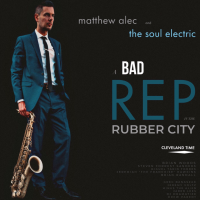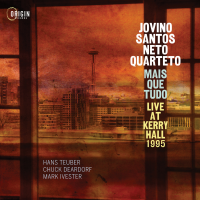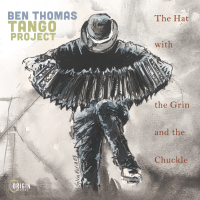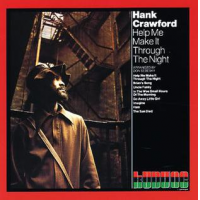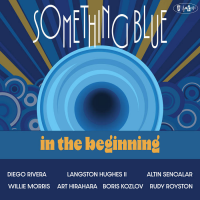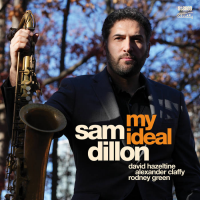Home » Jazz Articles » Liner Notes » Ralph Bowen: Five
Ralph Bowen: Five

Ralph Bowen
saxophoneThe disc at hand is Bowen's fourth album for the label and he returns to the organ combo format that made 2002's Soul Proprietor (Criss 1216) a significant departure and valuable addition to the tenor man's precious catalog. Bowen's muse is an advanced take on the freewheeling implications of

John Coltrane
saxophone1926 - 1967

Larry Young
organ, Hammond B31940 - 1978

Jimmy Smith
organ, Hammond B31925 - 2005
Of course, Bowen is no stranger to the range of possibilities inherent in the organ combo. In fact, when talking with this writer in preparation of his previous release, Keep the Change (Criss 1243), Bowen spoke fondly of time spent in Philly working with a number of jazz heavyweights. "I've learned a lot about the organic side of jazz through my experiences with musicians from Philadelphia," Bowen told me at the time. "I started playing at Ortlieb's and got to play with

Shirley Scott
organ, Hammond B31934 - 2002

Mickey Roker
drums1932 - 2017

Trudy Pitts
organ, Hammond B31932 - 2010
So when the time came to talk with producer Gerry Teekens about this new endeavor, both men decided an update to the organ format utilized on Soul Proprietor would be a sagacious choice. "Gerry and I threw ideas around and he had a hankering to do this kind of thing again because he liked the last album," says Ralph. "It was fine by me because I love working with organ. I mean, who wouldn't enjoy working with the likes of Bernstein and Yahel?"
Returning to the fold is trumpeter

John Swana
electronicsAlso back from Soul Proprietor are guitarist

Peter Bernstein
guitarb.1967

Sam Yahel
organ, Hammond B3A recent associate of Bowen's, drummer

Dana Hall
drums
Terell Stafford
trumpetb.1966

Branford Marsalis
saxophoneb.1960

Horace Silver
piano1928 - 2014

Maria Schneider
composer / conductorNo Bowen date would be complete without a sizable helping of his originals, and those who favor his unique compositional flair will have much to savor here, along with a few hard bop classics and a number from the rock pantheon. As Ralph tells it, "I tried to take a little bit of a different approach to this one. The tunes are less II-V-I based and a couple of them are a little more open harmonically. In other words, I tried to find a couple new avenues to explore."

Joe Henderson
saxophone1937 - 2001
Having recorded the original "Gordon" for his teenage son on Keep the Change, Bowen widens his circle of family dedications with "Baby Girl." "That's written for my six-year-old daughter Alexandra," Ralph says. "I hadn't up to this point written a song for her and I figured this would be a good opportunity to write one. Essentially it's a short form with an elongated solo section written in somewhat of a chorale type of format."
Aside from Bernstein's brief statement, it's Bowen who takes center stage for the duration on "First Hiatus," delivering one of the best and most intense solos of the date. In a nutshell, Ralph sums up the tune's construction by stating, "[This one's] really open as far as the solos go because there's really no solo form. It's just a rhythmic figure." As for the title, it references the fact that Bowen took his first sabbatical last fall after having taught at Rutgers since 1990. "It was wonderful because it was a good way to get things started for this recording project."
Still thinking of his vacation we suspect, "Free Time" has nothing to do with music that is free of meter or rhythmic pulse. "The title came after listening to the tune a lot," says Bowen. "It felt to me like a happy and light type of thing. From a harmonic standpoint, I was exploring counterpoint, although the solo changes are just those from 'Giant Steps.'" Taken in waltz time, solos are on tap for everyone on hand, including Hall, who constructs an organic statement chock-full of textural nuance and musicality.
Inspired by time spent working with

Horace Silver
piano1928 - 2014

Michel Camilo
pianob.1954

Adam Cruz
drumsb.1970
Clocking in at nearly 13 minutes in duration, "Drowning Man" might be considered the centerpiece of the album, an iconic number from the U2 catalog that originally appeared on their album War. Says Ralph, "I tip my hat to my lovely wife who has been steadily increasing my knowledge of classic rock. I guess I had a lot of gaping holes in my listening in terms of rock music from the '70s and '80s. So we were sitting around listening to some U2 just to see if there would be a song that might jump out in terms of arranging it for jazz. This particular tune really struck me, as it's quite a complicated and involved composition. In essence, I've managed a downsizing of the original theme and rhythmic intent of the sound. I tried to capsulize what I thought the tune was about and then convert it to this setting."
The precision that Bowen feels he's able to achieve when sharing the front line with Swana and the trumpeter's technical proficiency enticed the saxophonist to tackle

Woody Shaw
trumpet1944 - 1989
Thus concludes this new update reporting Bowen's present take on the music, a valuable document considering that they usually come few and far between. Still hovering somewhat below the radar of the average listener, the saxophonist continues to be a viable candidate for talent deserving of wider recognition. Asked to look down the road, Bowen quickly responds, "I'm really trying to do more as a leader, both recording and performing. I've done a lot of work as a sideman, so I hope little by little that I can do more as leader."
Track Listing
Step Lightly; Baby Girl; First Hiatus; Free Time; Blues Cruz; Drowning Man; Rahsaan's Run
Personnel
Ralph Bowen
saxophoneJohn Swana
electronicsPeter Bernstein
guitarSam Yahel
organ, Hammond B3Dana Hall
drumsAlbum information
Title: Five | Year Released: 2008 | Record Label: Criss Cross
Tags
Comments
PREVIOUS / NEXT
Support All About Jazz
 All About Jazz has been a pillar of jazz since 1995, championing it as an art form and, more importantly, supporting the musicians who make it. Our enduring commitment has made "AAJ" one of the most culturally important websites of its kind, read by hundreds of thousands of fans, musicians and industry figures every month.
All About Jazz has been a pillar of jazz since 1995, championing it as an art form and, more importantly, supporting the musicians who make it. Our enduring commitment has made "AAJ" one of the most culturally important websites of its kind, read by hundreds of thousands of fans, musicians and industry figures every month.
Go Ad Free!
To maintain our platform while developing new means to foster jazz discovery and connectivity, we need your help. You can become a sustaining member for as little as $20 and in return, we'll immediately hide those pesky ads plus provide access to future articles for a full year. This winning combination vastly improves your AAJ experience and allow us to vigorously build on the pioneering work we first started in 1995. So enjoy an ad-free AAJ experience and help us remain a positive beacon for jazz by making a donation today.

New York City
Concert Guide | Venue Guide | Local Businesses
| More...









 Buy Now
Buy Now


